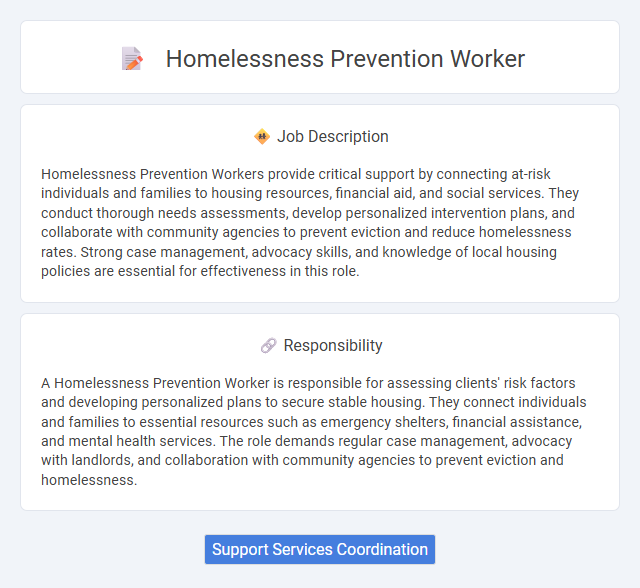
Homelessness Prevention Workers provide critical support by connecting at-risk individuals and families to housing resources, financial aid, and social services. They conduct thorough needs assessments, develop personalized intervention plans, and collaborate with community agencies to prevent eviction and reduce homelessness rates. Strong case management, advocacy skills, and knowledge of local housing policies are essential for effectiveness in this role.
Individuals experiencing homelessness often face complex challenges such as mental health issues, substance abuse, or economic instability, which may impact their suitability for a Homelessness Prevention Worker role. Candidates with strong empathy, resilience, and problem-solving skills are likely to be more suitable, as the job requires navigating difficult situations and providing support to vulnerable populations. Those lacking emotional stability or effective communication abilities might find this role particularly demanding and less suitable.
Qualification
A Homelessness Prevention Worker requires strong knowledge of social services, crisis intervention, and case management to effectively support at-risk individuals. Qualifications often include a bachelor's degree in social work, psychology, or a related field, along with experience in community outreach and client advocacy. Proficiency in assessing housing needs, connecting clients to resources, and maintaining detailed documentation is essential for success in this role.
Responsibility
A Homelessness Prevention Worker is responsible for assessing clients' risk factors and developing personalized plans to secure stable housing. They connect individuals and families to essential resources such as emergency shelters, financial assistance, and mental health services. The role demands regular case management, advocacy with landlords, and collaboration with community agencies to prevent eviction and homelessness.
Benefit
Homelessness Prevention Workers likely provide critical support that reduces the risk of individuals and families losing their homes, contributing to community stability. They probably connect clients with essential resources such as financial assistance, housing services, and counseling, which may improve overall well-being. Their role potentially decreases shelter system demand and fosters long-term housing security for vulnerable populations.
Challenge
The role of a Homelessness Prevention Worker likely presents significant challenges related to addressing complex social and economic issues that contribute to homelessness. Navigating limited resources and coordinating with multiple agencies may complicate efforts to provide timely assistance to at-risk individuals. High emotional demands and the need for crisis intervention skills probably require strong resilience and adaptability in this position.
Career Advancement
Homelessness Prevention Workers gain valuable experience in social services, case management, and crisis intervention, which opens pathways to advanced roles such as Social Work Supervisor or Program Coordinator. Mastery of client assessment, resource allocation, and collaboration with community agencies enhances prospects for leadership positions within non-profit organizations and government agencies. Professional development opportunities, including certifications in mental health and housing policy, contribute to career growth and specialization in the homelessness sector.
Key Terms
Support Services Coordination
Homelessness Prevention Workers specialize in coordinating support services to stabilize at-risk individuals and families, ensuring access to emergency housing, financial aid, and mental health resources. They engage with community agencies, healthcare providers, and housing authorities to develop personalized intervention plans that address underlying causes of homelessness. Effective support services coordination reduces recidivism rates and promotes long-term housing security.
 kuljobs.com
kuljobs.com